This suspension took place on Monday, October 9, pending the submission of written arguments by the parties before a final decision is made
The Kenyan High Court has prohibited the deployment of the multinational security support force in Haiti until October 24, 2023, following a petition filed by the “Thirdway Alliance” political party led by Ekuru Aukot and other Kenyan personalities.
This suspension took place on Monday, October 9, pending the submission of written arguments by the parties before a final decision is made. In the meantime, the government is prohibited from deploying any force in Haiti or any other country, according to the legal document obtained by AyiboPost.
Constitutional expert Ekuru Aukot, who worked on the 2010 constitution, strongly opposes any intervention in Haiti. In an interview with AyiboPost, the politician and constitutional expert deems his country’s government’s decision « illegal and unconstitutional. »
« Kenyans are completely opposed to this mission because it goes against our constitution and the police service act, » he emphasizes while highlighting that Articles 239 and 240 of the 2010 Kenyan Constitution outline the procedures for any mission on foreign soil.

The Kenyan lawyer and constitutional expert Ekuru Aukot. PHOTO/Courtesy
According to the Kenyan Constitution, only the military can intervene in a foreign country after parliamentary approval, Aukot explains to AyiboPost.
Furthermore, sections 107 and 108 of the National Police Service Act, which was reviewed by AyiboPost, require a reciprocal request between the two countries before a force can even be deployed into another territory.
The intervention currently being planned appears to disregard legal provisions considering the Haitian authorities « have never presented this request to the Kenyan government, » Ekuru Aukot continues.
The Haitian government has not responded to a request for comments from AyiboPost.
« We believe that the USA is using our president to do their dirty work in Haiti, » concludes jurist Ekuru Aukot, insinuating that the mission will be suicidal.
The intervention currently being planned appears to disregard legal provisions considering the Haitian authorities « have never presented this request to the Kenyan government, » Ekuru Aukot continues.
The United Nations Security Council resolution authorizing the deployment of a Multinational Security Assistance Mission (MSAM) in Haiti is seen as a violation of legal procedures, Kenyan actors tell AyiboPost.
On Monday, October 2, 2023, the United Nations Security Council voted nearly unanimously, with 13 votes in favor and 2 abstentions, on the resolution introduced by the United States and Ecuador, authorizing the deployment of a multinational force in Haiti.
Also read : Foreign intervention: the US says it is preparing “substantial support”
Contacted by AyiboPost, the Narok County Senator, Ledama Olekina is highly critical of President William Ruto. According to him, the head of state represents a puppet of the United States of America seeking international recognition while ignoring the issues in his own country.
« The United States has seen in William Ruto someone they can use to settle their own matters, » says the Kenyan senator, who regrets that the president used his power to make a decision on this matter without prior consultation with Parliament.
« We can’t do anything in this situation. I believe the Americans already have President William Ruto in their pockets. And the President himself has a parliamentary majority under his control, » explains the politician.

The Senator from Narok County in Kenya, Ledama Olekina.. | Nairobi Leo
Normally, Kenyan troops engage in United Nations peacekeeping missions at the regional level or with other international partners.
The country is known for its interventions in Somalia against the Al-Shabaab groups in 2011 and in the eastern Democratic Republic of Congo to combat the M23 rebels in November 2022.
Kenya is seen as a stabilizing force in East Africa due to the participation of its troops in peacekeeping efforts in the region.
In October 2022, the Haitian government made a request to the United Nations for an international specialized force and technical assistance to the police to help combat armed gangs in the country.
The Secretary-General of the United Nations, Antonio Guterres, in his letter dated October 8, 2022, and his report in April 2023, as well as the CARICOM through Jamaica in July 2023, emphasized the urgency for the permanent committee to make a decision regarding the situation in Haiti.
On July 29, 2023, Kenya announced that it had accepted to lead the multinational security support mission in Haiti.
Kenya is seen as a driving force for stability in East Africa due to the participation of its troops in peacekeeping efforts in the region.
During the 78th General Assembly on October 2, 2023, the United Nations Security Council authorized the deployment of this multinational force to Haiti for a period of twelve months.
This mission is put forth in a context where Kenya is struggling to maintain its own internal security, according to Kenyan citizens interviewed by AyiboPost.
In 2009, the United Nations declared that Kenya had one police officer for every 1,150 residents. The UN recommends one police officer for every 450 residents, highlighting the chronic understaffing issue faced by the police force.
Lire aussi : Retour sur 15 années d’échecs de l’ONU en Haïti
« I come from northern Kenya, and we have an urgent need for security, but our government has not been able to provide it, » complains Ekuru Aukot, a jurist and former presidential candidate.
Macharia Munene, a researcher at the Horn Institute for Strategic Studies in Nairobi, believes that the decision to send Kenyan police to Haiti is a complex matter and does not appear to have been well thought out.
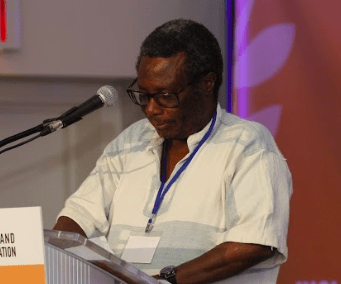
The researcher at the « Horn Institute for Strategic Studies » in Nairobi, Macharia Munene. | UNGA Conference
« The decision seems to have been made hastily, without considering many complications: the distance, cultural differences, language, and whether people want it or not, » explains Macharia Munene to AyiboPost.
According to the researcher, Kenya is assisting the USA in meeting their expectations in Haiti, effectively becoming an assistant to American policy, which he believes is not a good thing. Professor Macharia Munene also thinks that Kenya is attempting to establish a connection with Haiti under the auspices of the USA.
The world of culture also shared its thoughts. « I don’t like the idea of Kenya sending troops to Haiti at all. I think Kenya is simply being pressured by the United States and other members of the international community to do so in exchange for money in the form of easy loans, » says filmmaker Thuku Kariuki to AyiboPost.
The entrepreneur and CEO of Village Green in Kenya believes that his country should first address its own security issues before going to assist other countries with problems of security.

The filmmaker and CEO of Village Green in Kenya, Thuku Kariuki. | DW
AyiboPost attempted to contact officials from William Ruto’s government to obtain responses to the criticisms of Kenyan citizens without success.
As the largest economy in the East African Community, Kenya is a country with a population of approximately 47 million people.
Security challenges related to armed gangs, banditry, and the terrorism of the Somali group Al-Shabaab, which resulted in more than twenty deaths between June 3 and June 24, 2023, are a source of concern for Kenyans.
« The involvement of Parliament is not clear; it doesn’t seem to have been consulted. People who have a say also seem skeptical about it, » says Professor Macharia Munene, who believes that even Kenya needs security operations.
Lire aussi : L’ONU refuse d’assister les enfants abandonnés par les soldats de la MINUSTAH
Hussein Khalid is a lawyer and the CEO of Haki Africa, a pan-African human rights advocacy organization based in Nairobi, the capital of Kenya.
For the human rights advocate, the decision to send Kenyan police officers to Haiti is « inappropriate and has no legal and rational basis. »
Kenya is lagging far behind when it comes to respecting human rights, according to the activist. He cites extrajudicial killings, disappearances, and other blatant forms of human rights violations as examples.

Hussein Khalid, lawyer and CEO of Haki Africa. | FCNL
« We have a poorly managed socio-political situation here. As we speak, we are still dealing with communal conflicts along our internal borders, and we are still battling Islamic insurgencies on the Somali border. Human rights are not respected in Kenya, » observes Thuku Kariuki to AyiboPost.
« If people complain, they are silenced with unnecessary force so that the ruling class can feel safe and continue to abuse the rights of the people. Kenya has a long way to go when it comes to human rights. There is hardly a week that goes by without a confrontation between the police and citizens resulting in multiple deaths, » he concludes.
This year, in just three months, the police have reportedly shot and killed more than 50 protesters in Kenya, according to the opposition coalition Azimio. State officials lower the figure to around twenty.
According to Hussein Khalid, Kenyan citizens are still wondering what could have prompted their country to volunteer to lead this intervention in Haiti given the current context.
« There are other countries like Canada, France, and the USA, partly responsible for what is happening [in Haiti], and they are geographically, technically, and economically more capable of taking the leadership of such an initiative, » he continues.
Lire aussi : Les armes des États-Unis alimentent l’insécurité en Haïti
« When we know that these same countries have failed in multiple previous initiatives, » he explains, « we wonder what will become of this new intervention in a context where security issues in Haiti are becoming increasingly alarming. »
Other questions remain unanswered.
For Khalid Hussein, the Executive Director of Haki International, the United Nations should urgently address the issue of financing mechanisms for armed gangs and the illegal arms trade in Haiti, well before the financial and material provisions necessary for the mission. This is to prevent the intervention mission from exacerbating the already concerning humanitarian situation.
« Now, all we hear about is intervention, technical means, financial resources, etc., but there is no mention of how the United Nations plans to concretely address the human rights issues that may arise during this mission, » explains Hussein.
Pastor Danson Tunai, working on behalf of The Gospel Ministry in the Narok region, also criticizes this intervention.
« Here in our homes, banditry has created many orphans, disabled individuals, and homeless people, » he says. « Whether it’s in the regions of Garissa or Lamu, the situation is the same. Aren’t they human beings too, deserving of rescue just like the Haitians? » wonders the man of the church.
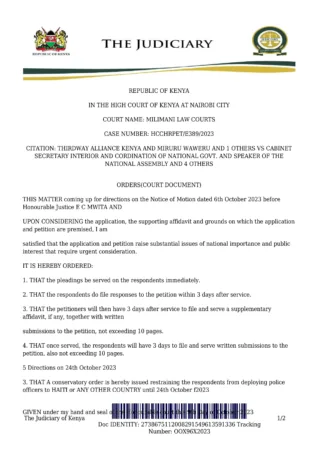
This blockage occurred on Monday, October 9th, while awaiting the submission of written arguments by the parties before a final decision.
Other voices are in favor of the intervention. Journalist Peter Wakaba, who has been advocating for more than a decade in Nairobi, believes that the decision to send police officers to Haiti is a good thing.
« As part of the international community, it is also our duty to ensure the security of people everywhere, » says Wakaba to AyiboPost.
The journalist believes that Kenyans will leave a positive impact through the support they bring to Haiti, and they will also contribute to helping the government of Haiti ensure the stability of the country.
« With the efforts of the United Nations and the collective efforts of all peoples, I believe the mission will be a success, » says Wakaba, who urges Haitians to regain control of the country and begin by enforcing the law.
By Jérôme Wendy Norestyl, Wethzer Piercin & Fenel Pélissier
English translation by Sarah Jean.
Cover Image : Kenyan police officers during a protest in Kibera, May 2, 2023| © Samson Otieno/AP
Watch our special presentation on the United Nations Security Council resolution in October 2022 regarding a sanctions regime against Haitian individuals involved in gang activities in Haiti, in comparison to a similar resolution adopted in Mali in 2017:
Stay in touch with AyiboPost through :
► Our Telegram canal : click here
► Our WhatsApp Community : click here

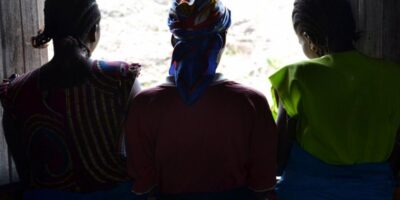
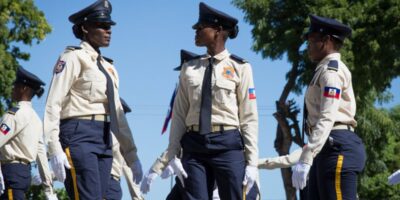

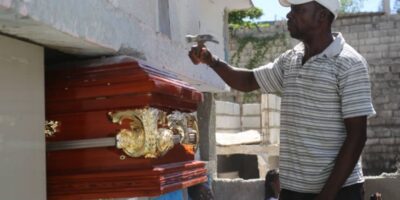


Comments